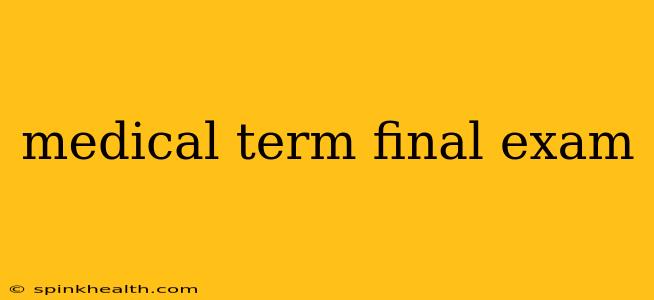Acing Your Medical Term Final Exam: A Journey Through the Terminology Labyrinth
The medical term final exam looms large, a formidable beast in the eyes of many students. But fear not, aspiring medical professionals! This isn't just a test of memorization; it's a testament to your understanding of the intricate language of medicine. This journey will transform your apprehension into confidence, arming you with strategies and insights to conquer that final exam.
Imagine this: You're not just cramming definitions; you're unraveling the stories hidden within each medical term. Each prefix, suffix, and root word offers a clue, a piece of the puzzle that unlocks the meaning of complex medical conditions and procedures. Let's embark on this adventure together.
What are the most important prefixes, suffixes, and root words to know for a medical terminology exam?
This is where the real detective work begins! No single list can encompass every word, but focusing on high-frequency terms and understanding the building blocks is key. Think of prefixes as directional indicators (e.g., peri- meaning around, intra- meaning within), suffixes as descriptors of conditions (e.g., -itis meaning inflammation, -ectomy meaning surgical removal), and root words as the core meaning (e.g., cardi- meaning heart, hepat- meaning liver). Creating flashcards with these components, and practicing building words from them, is incredibly effective. Consider focusing on systems – cardiovascular, respiratory, gastrointestinal – to organize your learning.
How can I effectively study for a medical terminology exam?
Effective study isn't about cramming; it's about building a solid foundation. Start early, break down the material into manageable chunks, and use various learning techniques. Flashcards are your best friend, but don't stop there. Try writing sentences using the medical terms, creating diagrams to visually represent their meanings, or even forming study groups to test each other. Active recall, forcing yourself to retrieve information without looking at your notes, is crucial for solidifying knowledge. Practice tests are invaluable for identifying weak areas.
What are some common mistakes students make when studying medical terminology?
One common pitfall is rote memorization without understanding the underlying structure. Simply memorizing a word without grasping its component parts makes it harder to remember and apply. Another mistake is neglecting to practice using the terms in context. Understanding the individual parts is vital, but seeing them in action within sentences or case studies is essential for true comprehension. Finally, procrastination is the enemy of effective learning. Consistent, spaced-out study sessions are far more effective than last-minute cramming.
Are there any online resources or tools that can help me study medical terminology?
The digital age offers a wealth of resources. Numerous online flashcards, quizzes, and interactive games can make studying more engaging and effective. Many medical websites and educational platforms offer free or paid resources specifically designed for medical terminology learning. Explore these options to find what suits your learning style.
What are some tips for managing test anxiety on the day of the exam?
Exam anxiety is a common challenge. The key is preparation. By thoroughly studying and understanding the material, you'll reduce the stress significantly. On the day of the exam, remember to get enough sleep, eat a nutritious meal, and engage in relaxation techniques like deep breathing or meditation. Review your notes briefly, but avoid cramming at the last minute. Most importantly, believe in your preparation and your ability to succeed.
Your medical term final exam is not just a hurdle; it's a stepping stone on your path to becoming a healthcare professional. By approaching it with a strategic and well-planned approach, embracing the stories within the words, you will not only pass the exam but also build a strong foundation for your future career. Good luck – you've got this!

